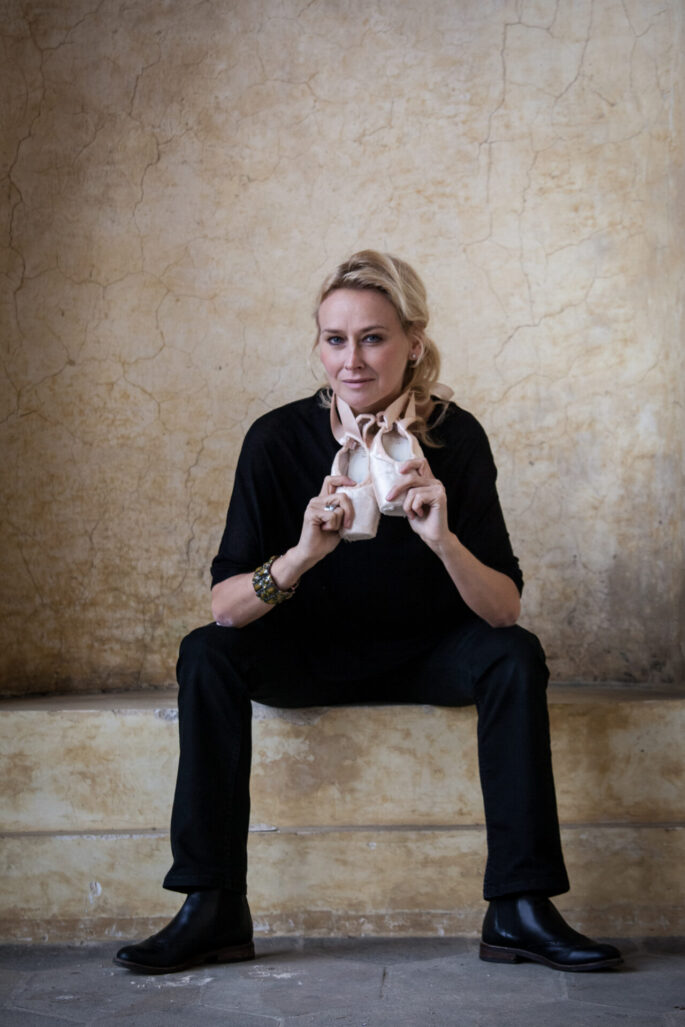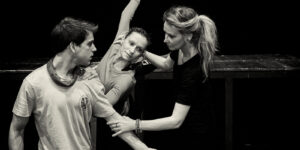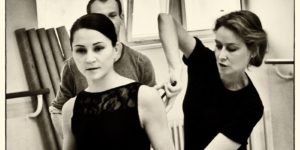Author David Kresta, Za Oponou 9 - 2020
Passion, unrequited love, betrayal and revenge are mixed in the story of a party that ended in a ruthless manhunt. The Blood Wedding by Spanish playwright and poet Federico García Lorca returns to the stage of the Moravian Theatre after eight years, but this time not in a dramatic performance, but as a surreal dance theatre. The production, choreographed and directed by Alena Pešková and with music by Gabriela Vermelho, will have its first performance in Olomouc on Monday 7 September at 7 pm. Alena Pešková has already successfully staged The Blood Wedding in 2013 with the J. K. Tyl Theatre Ballet in Pilsen. Michal Štípa, the artistic director of the Moravian Theatre Ballet, invited her to collaborate with the Olomouc company. "I have been following the work of Alena Pešková for many years and I am very happy that she has accepted the offer to work on this dramatic story. Each of her adaptations is always very interesting thanks to the imaginative choreography, modern movement vocabulary and music," said Štípa.
How does it feel for you to return to this title after seven years since its premiere in Pilsen? Do you see it as a continuation and development in Olomouc, or is it a new start for you, so to speak, from scratch?
It's like carving a statue that I've already carved once. I know exactly what I want the statue to look like. There's something I'd like to do better. I also feel like I already know how to do it, so it'll be easy, but... This piece of marble has a different quality. I need and want to be influenced by it. The content will be the same, the form will probably change. The marble is the local ballet company - the dancers. I'm not the kind of choreographer who relies on every angle of the little finger. True emotion is more valuable to me. And it shows up a little differently on each body. The dancers here are hardworking and empathetic, and I enjoy that. It's also like talking to myself seven years younger. Sometimes I think, "What was that girl thinking? Oh, this is good, this is too naive, this is brave...It's the eternal question of whether experience helps us or burdens us. I guess you have to know how to work with them.
How did the idea of transferring this famous "poetic" drama into a dance form come about? Did the famous film version of Sauro play a role?
I don't think Sauro's version even figured much here. At least not consciously. Rather, it was Lorca's text itself. It was and it is. Although I've read it many times, I still can't help but be moved when I quote it to the dancers in the hall. It is a text of genius in the sense that I understand the word. In my opinion, a work of genius can't be ruined by various interpretations, translations, reinterpretations. Just like Bach's compositions, even if they were played by a child's inexperienced hand or by the best virtuoso, you can still feel the profound genuineness. This is far from saying that we don't have to try to approach that genius - quite the opposite. It's the only way. Dancers' bodies endowed with perfect technique are not enough. The body must become a word, a poem, an emotion. And that's what's so exciting about it. In the ballet hall, the text is in Czech, English, Spanish, Italian... I don't understand all of these languages perfectly, but when the dancers whisper it to each other, I feel that we are together.
To what extent have you tried to be historically and "locally" faithful, is Spain reflected in the visual and musical aspects?
You know, I called our treatment surrealist dance theatre. And not just because Lorca had something to do with this artistic movement. The production is alienated from the beginning by the character of the Narrator, who will be interpreted directly by the composer Gabriela Vermelho at our premiere. And further, it's as if you wet all the prescribed realia in the individual - in this case, my - subconscious and let that do the work. The costumes, set and lighting speak more about the characters and the atmosphere of the setting than they do about the Spain of such and such a time. If you watch the performance with the zapateo, which are Spanish dance stomps, then know that this is what my subconscious mind threw out at me, influenced by all the lessons in this dance I have ever taken. I think in the case of Gabriela's music it worked the same way. The composer of the set is my brother, with whom I have worked for a long time, and who came up with a suggestion at the time that I had to deal with for quite some time. And then I found out it was exactly right. One perspective-running room that actually gets in the way a lot on set, and so it becomes a symbol of the limitations that everyone involved has to feel and work with. At the same time it is a space from which memories emerge, dreams disappear there, it becomes a cozy room, a prison, a car...
Did you have a vision from the beginning that Garbriela Vermelho would be not only a composer but also a performer or commentator on stage? Or did that emerge gradually during the preparations?
For the reasons mentioned, this was clear from the start.
What is the central theme of Blood Wedding for you, the underlying message? Is it the desire for freedom, forbidden love, the image of a society blinded by passion and revenge?
All of this together. For some inexplicable reason, I'm drawn to topics like the rules of society versus the desires and needs of the individual. Although, ironically, I think our time suffers from more of the opposite problem than, say, a hundred years ago. Today we do everything we can for the freedom and development of the individual personality often at the expense of the general order. Both extremes are wrong, of course. We also often see on the stage the sign Culpa - guilt. Who can stone who here? Moreover, there is again death and love-as the famous French choreographer Roland Petit said-the only two themes worth treating in ballet."




Comments are closed.